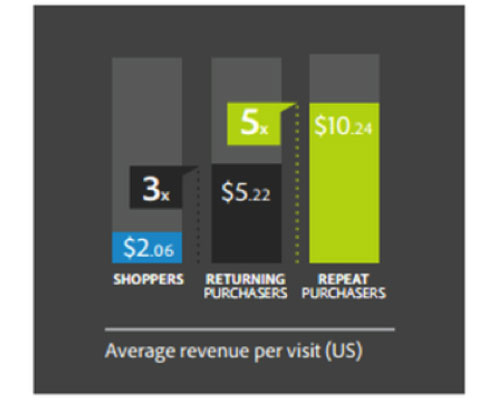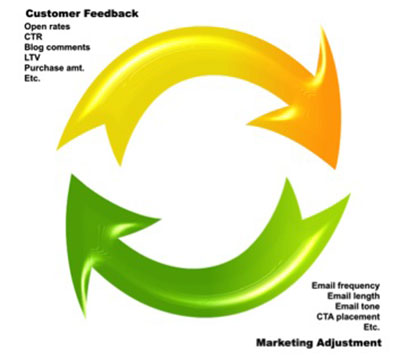Sending an email is like the proverbial handshake. You greet, you affirm, and you grow a relationship. You don’t just sell to faceless entities in a sea of humanity. You sell to individual people whom you have touched before. It’s called relationship marketing.
In today’s digital landscape, email is the medium of exchange–the way we grow our relationships. It doesn’t matter of that relationship is romantic or sales-related, email can facilitate it.
1. Email marketing provides engagement and relationship building with customers.
Every time a recipient sees your email, the relationship grows. She is reminded about you, about your product, and about your service. She remembers when she signed up to be on your mailing list. She recalls, perhaps unconsciously, how she felt when she looked at your product or service. Even if she’s not going to buy your product today, she is at least reminded of it.
As I mentioned in the introduction, my most engaged audience are members of my email list. I’ve seen first hand the relationship-building power of email.
Because I have a relationship in place, built on the trust of an email exchange, I feel more confident upselling, cross-selling, or asking something of my audience. Sometimes, I ask them to comment on a new blog post. Sometimes, I ask them to share it. It just depends. Whatever my request, I know that they are likely to respond positively, simply because we have built a relationship on email.
2. Email marketing increases the Lifetime Value (LTV) of your customers.
Email marketing is one of the most powerful methods of improving the lifetime value of your customers. In fact, according to many marketers, it’s the most important method.

What’s so important about lifetime value?
In terms of revenue, a lot. The average revenue per visit for an ecommerce shopper is five times higher for a repeat purchase, in a study from eConsultancy.
The likelihood that you will sell to a new prospect is only 5-20%. But the likelihood that you’ll sell to a second- or third-timer is 60-70%! The more a customer returns to the site, the more likely that customer is to purchase.
Your repeat visitors are your most valuable visitors. The longer they continue as customers, the greater their lifetime value.
In a study by the Database Marketing Institute, Arthur Hughes created average predictions of customer LTV based on an email strategy. Look at how these numbers grow year over year.
By enhancing email strategy with techniques such as personalization, these numbers grow exponentially.

Such is the power of email marketing, and its effect on LTV.
Today, without email marketing, there’s no such thing as LTV. And without LTV, there’s a whole lot less revenue.
3. Email marketing produces customer feedback, which enhances the brand experience.
In case you haven’t tried it yet, you can learn a lot about your business based on email marketing. Most email marketing platforms have built-in analytics reporting tools that allow you to gain in-depth data on customer activity, click-throughs, purchases, etc.
Every time I mine up data on my email marketing, I’m overwhelmed with how valuable this method is for my business.

This data is feedback. Many people on my email list send me direct emails. I read every one. But even if they don’t, I have data, which in some cases is more telling than an individual message. When I distill and translate this data, I come up with a very compelling form of feedback.
That feedback, in turn, allows me to adjust my email marketing, and to further enhance the experience of the customer.
As marketers, we love our data. And with email marketing, this data is particularly powerful. The data tells a story that allows us to refine the customer experience.
Email is a must-have tool for every marketing professional. I have difficulty believing how an online marketing effort can be successful without it. I’ve learned from my experience in starting several companies, that email marketing is core marketing strategy for shaping and enhancing the sales funnel, building relationships with customers, improving the lifetime value of customers, and gaining powerful and actionable feedback.
